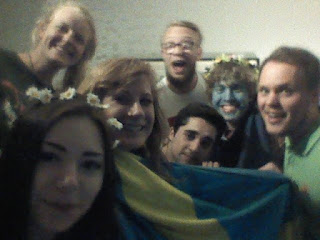Student Nations
One of my favourite things about student life in Uppsala is the nations. Its something very unique to Uppsala (they have them in Lund too but Uppsala is way better of course) and something I didn't really know anything about before I came here. So in this post I hope to explain a bit about what they are, how they work and why you should join one.
What are the Nations?
History lesson: In the 16th century, students at Uppsala were a bit wild and were spoiling the city for everyone. The university decided that students should be policed by inspectors to make sure they didn't misbehave. Nations were created and each represented students from a particular county or region of Sweden, and if you did something bad, then your nation would tell your parents and even your church back home so you could be suitably punished.
 |
| What student nations looked like in 1608 (probably). |
Nowadays, the nations are no longer there to police students, and are social groups which arrange all kinds of activities and give students a nice family kind of feeling. The student unions and the university itself arrange some things, but most of the fun stuff that happens in Uppsala is organised by the nations. They also run pubs, cafes, club nights, which are significantly cheaper than anywhere else in Uppsala.
How does it work?
Originally, students had to join the nation of their home region, but today everyone is free to join whichever one they want. Swedish students do often join the nation of their home region, but international students with no such loyalties can see which one they like best. You can also be a member of more than one nation if you want.
To join a nation you have to pay a membership fee every semester, which varies a bit between nations but is usually around 250 SEK. You will then recieve a nation card which lets you into not just things at your own nation but at all 13 of the nations.
Why should I join?
Joining a student nation is not compulsory, but to me it is such an essential part of student life here you'd be missing out if you didn't. You will meet loads of new people there from all kinds of different courses and backgrounds. While physicists are obviously the greatest people ever, sometimes it is nice to get out of the Angstrom bubble and talk to people studying completely different things.
You will also have the chance to take part in loads of different activities, many of which are free. My nation for example has a running club every wednesday, but other nations have yoga, photography groups, video gaming sessions, and loads more. One of my favourite things at the nations are gasques. These are super fancy dinners which they organise, where everyone dresses up fancy, eats posh food and sings weird Swedish songs. Its a really traditional Swedish thing which I think everyone in Uppsala should do at least once.
 |
| A gasque at Gotlands nation. |
The nations also offer opportunities to work. You can bake cakes, bartend or sell coffee for a bit of extra income (check your visa rules if you're from outside the EU though) and have a lot of fun doing it. You can also get involved with the running of the nation if you have some good ideas.
 |
| Working in the kitchen making posh gasque food. |
Which one should I join?
When I decided which nation to join, I visited them all to see what each one had to offer and the one I liked best was Gotlands, where I am now a member. Each one is slightly different and perhaps appeals to different people. There are stereotypes associated with each one and you will hear all kinds of negative things from people talking about rival nations. The best way to decide though is to go and talk to people there, see what they're offering and what the nation is like. I would highly recommend Gotlands nation for international students though, its such a friendly place and it really made me feel welcome in this new country.
This page lists all 13 of the nations (some are very difficult for non-Swedish speakers, but don't worry they mostly have easy abbreviations):
This is a great website which lists many of the activities each week at the nations:








